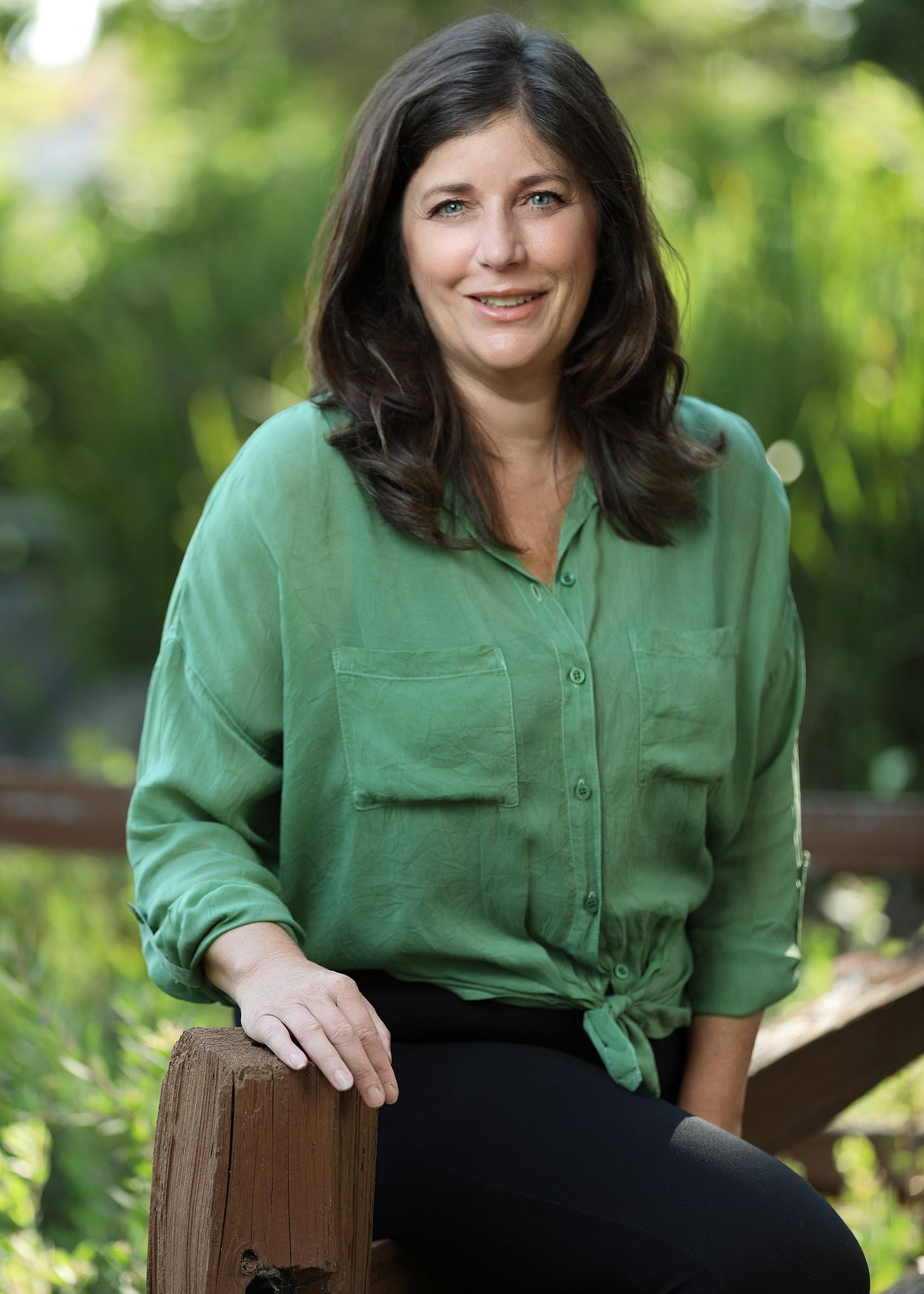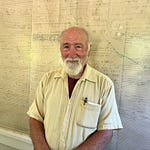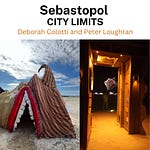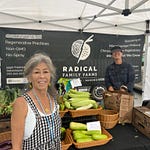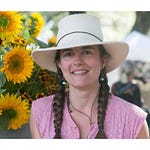The Vice Mayor of the Sebastopol City Council, Neysa Hinton, speaks her mind even if it might not be completely politic to do so. She knows her own voice and it is a strong one. A working mother, who has worked in radio and now in an assisted living facility, she has juggled a career and her duties as an elected official.
Neysa talks about growing up in Sebastopol but also in Jerome, Idaho where she got started in working in radio. She moved back to Sonoma County and continued to work in radio here and in San Francisco. In 2016, she ran for the City Council and was elected and she was re-elected in 2020.
When she started out as a new city council member, she did not feel entirely welcome. She dealt with a pecking order established by more senior members who had many years of experience in local government. She acknowledges the learning curve that she had to go through, which will be much the same for the newly elected council members.
She discusses the future of the Sebastopol Fire Department, a complex and contentious issue that will be decided by the new council following an outside consultant’s report. In addition, we talk about the City Manager retiring and how Sebastopol has been lucky to have its leadership serve for a long time.
At an assisted living facility in Marin, Neysa had first-hand experience dealing with a vulnerable population during Covid. She reflects on some of what happened during Covid positively and negatively and she hopes that it made us more aware of our neighborhoods and our neighbors.
Finally, she will not endorse any local candidate running for office but she hopes to welcome them and work with whomever is elected in November.
Transcript
This transcript was lightly edited.
Dale: I'm joined today by Neysa Hinton who is the Vice Mayor of the Sebastopol City Council, one of two members of the council that will continue on into the next year. Welcome.
Neysa: Good morning. Yeah. Here we are on a beautiful Tuesday morning at nine o'clock. And we have City Council tonight.
Her Background
Dale: I'd like to start just getting to know a little bit of your background. I think you grew up in the area.
Neysa: I am actually fourth generation here. My mom graduated from Analy and I grew up outside city limits towards Freestone. My first K through second was at Harmony School District, and then we moved closer to Twin Hills School District. So I went to Twin Hills through seventh grade. After that we left the state for a number of years, and I lived in a variety of different states and went to a variety of different schools.
I came back to Sebastopol. I went to Analy most of my junior year for just a semester and a quarter, and then I finished my senior year up in Jerome, Idaho. I went to junior college there at College of Southern Idaho in Twin Falls. And that's the start of what ended up being a 25 year media career.
I started as a copywriter for the radio station and the female on-air voice. And during college I did AM news and overnights. So all total three and a half years. But I was missing California and as a young adult, I saw my life here. And so I moved back in 1985 and got a job at a local radio station and went to work in Sonoma County radio.
And shortly thereafter, when I saved up enough money to put the deposit down, I moved to Sebastopol inside city limits, and I lived for many years over on Nelson Way in Sebastopol there across from like Burbank Heights.
Dale: What did you learn and like about radio?
Neysa: Like a lot of young people at that stage, it was really exciting once I got in. I was a huge radio listener as a teenager. I was one of the people that would call up and win the records. And I didn't really understand how it worked and I wouldn't have got the job had I not registered as a new student with my counselor and they had a posting of somebody that could type with good English grades for a copywriter. And frankly, I thought I was applying for a job at a newspaper.
I always saw myself at that point being a school teacher. Probably English and and speech and debate. I was very involved in my speech team in my senior year in high school and competed on a circuit. So honestly, once I got in the radio station, I was just like: Wow, this is a really fun job.
I worked for KSRO and KREO at the time and I became the first female local sales manager in Sonoma County radio.
It didn't pay very much. I was broke all the time, and so I had to waitress to augment my love job, which a lot of people in the business do to get started. Then three and a half years in, I thought about other careers. I did actually apply to be an international stewardess at the time, crazy with Pan Am. But radio just kept popping up for me and I just ended up just staying in that career. And then in my mid twenties I converted to sales when I came to California because that was the job I could get. And then I just had some success at it. I worked really hard and in my mid twenties I was promoted by a new ownership group that came in.
I worked for KSRO and KREO at the time and I became the first female local sales manager in Sonoma County radio. And that was a huge honor. Frankly, I left when I had my first child and she was born in 1993. I was a stay-at-home mom for one year and and did that and then went back to work for another radio group in Sonoma County where I was for another 12 years.
So long runs with the radio groups. I'm a loyal person. I really like working with the team and once I get to know the team, I usually stick around.
Dale: It was also an industry undergoing a lot of change during those years too, wasn't it?
Neysa: So when I got here in 1985, the FCC rules changed and you could own an AM and an FM, and so that was the first consolidation. I went to work for little KREO and then we were bought by the old guard KSRO and we did a transfer in November of '85, and KSRO at the time was owned by Evert Person who owned the Press Democrat. So we had an owner that owned the newspaper in town, the oldest radio station KSRO in town, and then the number one top 40 FM.
It was just a lot of change. You have to be flexible. You got new owners, he sold and then we were always moving. And at the end of the day, you put your head down and you do your job. . .
Running for Office
Dale: Do you remember when it occurred to you to run for office or when you started thinking about doing that?
Neysa: I was raised to volunteer. My mother had us always involved in everything. We worked and we volunteered. That's just how I spent my childhood. I became a Rotarian, one of the first women in 1990 to be a Rotarian here in Sebastopol.
I think we should celebrate everyone who puts their neck out there to run a campaign, because it is scary.
And then I could do that and still work my job. And so I did that for 20 years. And in between all that while working, I was raising kids. So I was always like a team mom at baseball. I helped start the Farmers' Market in 1990 also. That's before I had children. So I was always involved and then I ended up taking a media job in San Francisco because the Press Democrat was once again selling.
So I went to work for KGO in San Francisco. And so I was in the city trying to figure out, okay, can I stay in Sebastopol? I had to follow the job. That happens a lot in media. I had to quit Rotary, which was a hole in my life. I wasn't connected to my community.
And then I got involved helping as a volunteer in the supervisor's race in 2016 and I learned a lot. I had never really been involved in politics. I walked houses. I hung signs, campaign signs. We did parades, which I was used to from radio, and then all of a sudden there were two open seats that July -- it became obvious that there were going to be two open seats. Two council members in Sebastopol were stepping down and I learned that the best time to run is when there's not an incumbent in the race -- open seats.
That's when it dawned on me, Hey, I can do this. The meetings are in the evening. I still worked out of town. And so that's where I decided to throw my hat in the ring.
Dale: What year was that?
Neysa: 2016. At the time, I was also dismayed about in that year the Supervisor's race included Lynda Hopkins, our current supervisor and Noreen Evans, and I believe at that time it was one of the most expensive Supervisor's race the county had seen. I think they combined raised over $800,000. So I also was like, wow, that's a lot of money to run a campaign and is that what you have to raise to be elected?
So I was curious about that. And so for me that year, I ran a campaign where I wouldn't accept more than $250 from any donor. We don't have any campaign limits currently in Sebastopol, and we didn't at the time. [correction: the limit is now $4700]. But that was important to me. I wanted to run a grassroots campaign and I did and I got elected.
Dale: But you did get some donations larger than $250 come in, right?
Neysa: So a funny thing I was running my own campaign and trying to figure it all out and I had a website where you could, you could I think they used Stripe, they called it, and people could go in and put in their donation, it just goes automatically to your bank.
I didn't set the limits within the campaign. On the website it said don't donate more than $250, but, of course, who pays attention to the fine print, right? So all of a sudden I got $3,000 and I was like, Oh my gosh, I think I only raised that year, like $3,500. And I was like, Ah, where'd that come from?
And I actually had to file official paperwork. I had to go back to the donor and say, you didn't read the fine print. I'm only taking $250, so I'm giving you back $2750. And the donor's okay, no politician has ever given me back money. Really? Who are you? And then I had to file it with the State.
But I will say in this latest campaign, I wasn't quite as stringent, so I took personally up to a thousand dollars and I did get a couple, maybe one or two of those. Same thing, set a personal limit.
I do understand that it's expensive to run a campaign and you can't do any good until you're elected, right? At the end of the day you don't want to be beholden to anyone, but you also got to get elected.
Dale: So how did you build supporters? You're working in San Francisco. While you grew up here, you haven't necessarily been in the same place the whole time. It's one of those questions, yes, I could run, but who will vote for me?
Neysa: That's the scariest part. I think we should celebrate everyone who puts kind of their neck out there to like run a campaign, because it is scary. But for me it feels --I've lived in this town, I've lived in my current home and then I lived on Nelson previous since basically 1987. So I've been in town and people knew me through my kids, right? Cuz my kids both went to local schools. So Parkside, Pine Crest, Brookhaven, Analy, and I knew parents. I was very involved in obviously Rotary. I've done Learn to Swim. So you really just start to tell your story. Some people recognize you with a name like Neysa, it's hard to get, but then once you get it, there's not very many of us.
Dale: Is that a name your mom came up with?
Neysa: It's like a old history. I was raised Catholic. It's associated technically with St. Agnes, where my mom got the name.
Dale: Interesting.
Neysa: I was born in the sixties. I think she wanted to be traditional without being traditional.
But the main thing is I walked almost all the houses myself. So every day when the light was good after work, I'd walk the houses with hangers and talk to people. And then I think I did. I might have done, I don't know. No, I don't think the first election I did mail. The second election I raised more money and I did a mail piece. But I mainly just walked, showed up at every event, every debate and just said, This is who I am, kind of thing.
Dale: And you got elected.
Neysa: And I got elected.
Dale: And what was the margin?
Neysa: Oh, it was a big margin. It was I'm just trying to think. I think it was like I got elected by 29%, but to be fair, a lot of getting elected and getting elected by a big margin is also who you're running against.
To be fair, a lot of getting elected and getting elected by a big margin is also who you're running against.
I was elected with Michael Carnacchi, who ran a non campaign and then at the time, Craig Litwin, who's very experienced, but he decided to run after the ballot was finalized, so he ran as a write-in candidate that year. So, I had a write-in candidate, who had been mayor and had been on the council and had name recognition, but write-in is really difficult, even if you're very polished. And he was doing direct mail and all kinds of stuff. And then Michael was like, I'm not doing anything. I'm not doing signs. I'm not doing anything. I'm not walking. He didn't even walk. He just wrote a ballot statement that he thought he could get elected off and he did.
Dale: How many candidates? Just those three?
Neysa: There was one more guy, and I'm trying to remember his name, but he was a younger guy, also didn't run a campaign. Okay. So I think there were four that year.
Then I had a much more heated race this last time because I had two very strong candidates in the chair of our board of our planning commission Evert Fernandez, and, or am I saying that right? Who didn't get elected. And then also Diana Rich, who started early, ran a really intense campaign with a lot of things that resonated with people.
Dale: So it does seem like if you work hard at it, it pays off, right?
Neysa: Yeah. If you work hard at it --they always say that signs don't win an election. I'm an advertising background. Signs are name recognition. You're not gonna vote for somebody by a sign, but you are gonna know they're in the race, right? Versus you look at the ballot and you're like, Oh, I never heard of that guy, or gal or whatever.
Working hard to win does make a difference because the average person -- there's so many news sources this day, like how are people getting their news? So if they don't know about you, if they can't Google your name and read your positions, for example.
And I do think voters vote differently, like the old school is, like the Press Democrat endorsements mean something. The young school, like my two kids are in their twenties now, they're Googling. They're like, Okay, let me read about her online. The older crowd, I think is looking at who's your endorsements?
Okay. If this guy, if these people have endorsed you, it's saying something. So you know, the voters and of course we know the more invested you are, so generally 35 plus are generally the voters, the younger twenties are, It's hard to get voting from that segment.
Dale: Sadly.
Neysa: Sadly. But I think I always voted in every election, but of course I worked in media, so I was more informed and interested.
Taking Office
Dale: So you take office and you become a city council member and first-time office holder. What was that experience like?
Neysa: There's people that are very welcoming and there's people that want to try to educate you on their views. I think it depended for me, my own council, they already had three incumbents and there were two of us new. And they didn't really, I mean, they probably favored me frankly over Michael. He had a harder time. I think you automatically have a relationship with the person you're come in with, right? Because you're both the newbies like trying to figure it out.
And I generally get along with everyone. I can always find a common ground, like we have something in common. And I tend to focus on that just as a, I don't know, call it my sales background or just my optimistic viewpoint. I always feel like I have something that I can like about everybody.
It was really difficult as a new council member.
But it was really difficult as a new council member because you learn really quickly that a lot of all the committees, the good committees are taken by in Sebastopol by the incumbents, the people already sitting. And there is a point there, as they would tell me when you look at politics in general, it's the senior members that hold all the committee seats in all our government. It's not that rookies coming in that get to become the chairman or something. They would say basically we have the knowledge from having been here so many years, and we've already been sitting on, let's say, the Clean Power Committee. So we've already been through the chair, the vice chair. It's really important to keep people who are experienced in that realm on those committees.
And also there's a pecking order on those committees, right? So you're a new council member on those committees. You're not getting the chair or the vice chair position. So there's a pecking order that I think as a new council member I found very frustrating, to be fair. But now I'm the oldest council member at six years.
So I'm kinda like, okay, I can see that position. We can't throw it all up in the air with nobody with any experience or historical knowledge. I compare it to a new job. When you think you know what it's gonna be like and you walk on, but of course it's completely different. And then the longer you do the job, the better you get at it.
So I just think it's a balance. And with this big change, which is the biggest change I think Sebastopol council has seen in years with three new people that can swing the council because three to two vote wins. I think it's really important to work as a team. I really want to welcome anyone. If the voters choose them, then as far as I'm concerned, they're on the team and we have to work together to make it happen.
And I don't wanna be like, Oh, I've been there the longest. I'm in charge. I'm not really that person. But I also feel as the senior member of the council, I want to take the lead to make sure everybody feels included. And if somebody's got a committee they want, I want to say, Okay, give me the reasons why, you know, and what makes you gonna be a good member and let's try to place people where qualifications kind of fit, versus sometimes people want the more important committees, right?
Dale: But there was a learning curve for you in...
Neysa: Oh, absolutely. Absolutely.
Dale: And they'll have a learning curve as well.
Neysa: It's funny because I was a top vote getter, one of the council members that I served with, she goes, just cuz you're the top vote getter doesn't mean you get to be Vice Mayor.
And I said, Oh, okay. I didn't expect to be vice mayor on year one. And then I heard it's happened once in the past, but it really didn't go well. And I was like, Okay, yeah, no, I think I've got a lot to learn, right? I'm not gonna jump on in and say, hey. But it is possible. I just am like, okay let's just work together and see what everybody's goals are.
And I think it would be important. We didn't do it last year, I think as a council, but we might have in previous years; we set a work plan in the beginning and we get everybody's what's their most important issues so that we can prioritize the work of the council for the year.
And I think that's gonna be really important with three new members to set that up.
Three New Members Will Be Elected in November
Dale: Do you think there'll be a new direction for the city council with the three new members? Like you talk about priorities you perhaps have your own, but they'll come in with their own.
Neysa: They're running on campaign issues, many of them, I wouldn't say all of them, but many of them are running on-- we don't like decisions the previous council made or is planning to make, I'll just say. I'm like, Okay, that's fair. They always say something motivates people to run.
They're not just, they're they're running on something and they have an idea. And I was telling somebody the other day you can run on an idea, but technically you're not supposed to make up your decision until you hear all the agenda item, all the background. You are informed.
Many council members do their own research a little bit. They go walk out. If we've got especially a planning decision to make, we'll go visit the property and look at it before we get on in the meeting. And then you're, you really need to hear from the public. I've told people like that, that have called me to lobby for their position on votes.
And I'm like, Okay, I hear you. But I had to say to some people you understand, I can't tell you how I'm gonna vote. I can't make my decision up because you have to do it in the public forum and with full transparency. And we have to hear everything and all from everyone and all the public has the right to speak.
And then we make a best educated, like what we think we should. So you can run on a subject, but you really can't make up your mind or make a promise. It's my understanding of the law.
The Future of the Fire Department
Dale: And can we take the fire department as an example of a very contentious issue that has come up in this term, won't get resolved probably till the next term. I wanted to raise up, not so much what's your decision on it, but it's an example of a pretty emotional issue.
Neysa: And this part will be, this part of your interview will be watched by many, No doubt. Yeah. It's a super big issue.
Dale: Yeah. But how do you deal with that? Just that where there could be a rational way of thinking about this. There could be an emotional way of thinking. Both are legitimate in the sense of how people feel. But how do you deal with that as a council member?
It's a super big issue…people are gonna be voting for candidates based on this issue.
Neysa: The most recent in Sebastopol history issues that I think are similar because this is a big decision are saving our hospital. That was a huge issue. Private people tried to save it, we taxed it. In the end, we couldn't. And then the high schools right. Super emotional issue. Consolidation. Still not really settled. Probably school board members are going to be decided on that issue, I suspect. And now we've got fire department, right? And people are gonna be voting for candidates based on this issue. There's no doubt about it. I was on the original subcommittee to look at long-term planning for the fire department.
A lot of people don't realize that I served for a year on that committee with Una Glass and then when Diana Rich got elected and we changed up our committees, then now Diana Rich and Patrick Slater are serving on that committee. So there have been two committees to study the issue.
A lot of people don't like that we hire consultants, but we wanted, it's such a big issue, we wanted to hire a neutral party consultant. I think they're called Matrix. They came highly recommended. They are not from the area. But that means they're not, don't have a bias in the game. And yes, that cost us $40,000.
I really don't like hiring consultants, but I think that's money well spent to get some outside advice. They've interviewed a variety of city staff and firemen and everybody, and we're gonna get that report, I think after the election, interesting enough. I think it's on target to be launched or delivered in second meeting of November.
It's a big issue because we're gonna have to pay more no matter what we do. I think that if we were to consolidate with Gold Ridge, we would have to bring our tax base up to match theirs, so that all the tax is the same. Or if we hire a new chief and we run our own department, we're going to probably have to-- the fire department's been underfunded for years because we don't have enough money to fund a full police department and a full fire department and run our city. We just don't have the tax revenue and a lot of people are like, I went to the debate and I'm, they're like, Oh yeah, we need to get more tax revenue.
Generally how you get more tax revenue is hotels, big ticket sales tax, like car dealers that we used to have. There's no car dealers anymore. And chain stores within city limits, which we don't have. So to get more tax revenue, hopefully Hotel Sebastopol will open up and that will help our tax base.
We need to attract more business, which is why the council has been investing in Relaunch Sebastopol, and prior to that Craig Litwin's consulting company through Covid. So unless we go to the tax payers of Sebastopol and say, Okay, you gotta pay more, and I gotta see the numbers before I can really make a decision. Like how much more if we keep our own fire department? How much more is it with Gold Ridge?
Fire departments all over the county are consolidating. Look at Sonoma Fire. They took in Bodega Bay and Forestville and so consolidation is a fact of life. And I think the issue is now because we have a retiring chief that's been there 30 plus years.
And so do we make promises to a new chief and bring in a new chief? So it's like a long range decision. And the other thing is the firemen are like you didn't ask us, but the firemen make stipends. And those stipends are substantial. They're not like my $300 a month stipend.
I can't vote on an issue where I have financial interest. I find it interesting because I think frankly, and the fire department isn't gonna like me saying this, especially in an interview, but if you have financial interest over a certain amount, I don't think you should be able to vote or have a real opinion because how do you separate your financial interest, which as an elected official, I'm forced to do, I have to do it, from this is what I think is best for the fire department. I got a letter delivered to my house and it's signed, if I put dollar signs of stipends next to those names, there's financial interest.
When it all opens up, it's gonna be, Oh, I mean, the people running.
Yes, I want to save the fire department. I love Sebastopol Fire. I go to the pancake breakfasts. I have for years. I threw one of my kids' birthday parties that I bought at a charity in the firehouse. I love firemen. My, my nephew is a firemen. It's not about that and that makes it really difficult. Because it's just people hear: What do you mean we're not gonna have a fire department? And I'm like yeah, it's a bigger issue.
Dale: It's interesting. I think you're pointing back to history of the Palm Drive and the El Molino-Analy things are examples of very difficult decisions that became very emotional and certainly in the case of Palm Drive led to some bad decisions there because we wanted to save something that wasn't gonna work.
Neysa: I'm really interested in this report. I'm the one who called, and a lot of people forget this, you can look at my history or the Press Democrat, I'm the one who called for more time. The firemen said they wanted more time. I'm the council member who called for more time, and I think it was on a split vote, a three to two back in June or May. It's not a decision that I want to rush. I called for more time. We already had money for a consultant. I think there was a recommendation to move forward on consolidation.
I said I wanted to see that consultant's report. I don't want to make a wrong decision and I can't do it out of emotion. I'm elected to make sure to study the issue. That's why the voters vote for me and the average person doesn't have that much time to study it and follow all the meetings and everything, and that's why we're in office. It's not a easy decision, but more time, more facts I think will guide us to the right decision.
The City Manager Retiring
Dale: The city manager is retiring. Larry McLaughlin, right? . He's been there a long time. That is someone that you'll have to replace in this new term. Is that right?
Neysa: Yep.
The great part about the City of Sebastopol since I've been involved six years is that we had all these long-term department heads that have been with the city a really long time.
Dale: Do you think his retiring is related to the fire issues or other kind of things that are happening in town?
Neysa: No. Like anybody's retirement, there's right signs. The city council hires a new city manager. Would it have been best to have a brand new city manager hired, like now when we're about to have three new council people that maybe would've made a different choice?
Or is it better to hire somebody with the new council and the city manager reports to those people? So I think that the timing-- Larry's been around a long time. He wants to relax and I don't blame him. He's going to do his practice. We are the last city that has a city manager, city attorney, I think, in Sonoma County.
And so I would like personally to see Larry maybe maybe stick around and help us with some issues. Depends on who-- it really depends on the new council and what their feelings are going to be. And it also depends, it's really hard to find great employees. So depending on when we do our search, who we get sometimes that will guide the decision, okay, we thought we were hiring a brand new person and blah, blah, blah.
We also have our assistant city manager, Mary Gurley, who I think has no intention to take that position because she's been with the city a really long time too. But I'm, again, these are all questions. Sure. He just announced. Nobody intends to do anything with that until we seat a new council.
Dale: But it is a piece that with three incumbent council members resigning or not going forward and then the city manager, there's a lot of change.
Neysa: For sure, there's a lot of change. It's easy to look at it and see is it related. But there's no smoking gun here. I think it's just a matter of timing.
The great part about the City of Sebastopol since I've been involved six years is that we had all these long-term department heads that have been with the city a really long time. Flip side of that is those department heads were close to retirement. So you know, Bill Braga, Larry. When you've served and you've got a pension and you're getting like, maybe they wanna quit and go garden.
I don't blame them. And then Covid, I think has, impacted the bustling city hall with all the employees coming to work. You know that's a fun thing if you like to come to an office every day, to look forward to. And we've all been sidelined for three years. City Hall is like a ghost town when I walk in there. There's three employees at one time because a lot of people are still working a lot on Zoom and so that probably has a lot to do with it too. Let's face it. Covid has changed a lot of things and the way people look at life of Oh, okay, maybe I should do some fun now.
Coming Out of Covid
Dale: We're not technically post covid, but we're getting there. Do you see positive changes happening this year or things that didn't happen during Covid beginning to happen in town?
Neysa: Yeah, I think that just as a general rule of thumb, and you know, I run assisted livings for the elderly, so I never had a time off from Covid.
I was frontline worker in the heat of it frankly. And where people couldn't come into those facilities for a period to even see their families, that was a lot. But I think as a kind of general rule of thumb, it's been really hard on our youth. Been really hard on parents. I can't imagine homeschooling my own kids.
I would just -- that is not me. It's not because I couldn't, it's because I don't need that much kid time, or, they wouldn't listen to me very well. But so I think that it's been really rough for a lot of people and our youth in particular that didn't get the things they looked forward to, like their high school years or their preschool years or whatever.
And then I think it's also been really isolating for the seniors. But on the flip side, the city really came out and supported. I can think about when we did that restaurant drive. Eat local, go get to-go food. We supported Sebastopol World Friends. We picked up our food and then we all went on Zoom and we like ate, sampled our food from the different restaurants and they had their celebration. So I think it brought us back to our roots, frankly. And it brought us back to, okay, we can get this done.
I was a delivery angel for at least six or eight months for Ceres during that period because I was vaccinated early and stuff. I hadn't been able to do that like my whole life, but I had wanted to.
So I think it really brought us back into also our neighborhoods, like helping neighbors. We're all home or a lot of people were waving across the fence. And I think now that we're coming out of it, the parklets were great. People were like, Wow, we can walk around more, so that was encouraged. We can bike, all those things were encouraged to slow down a little bit and appreciate our hometown.
On the other side, we know the negative of that. The real estate market has just gone through the roof because I think all these city dwellers came up and discovered us and they've drove up our real estate prices a little bit.
On one hand there are new neighbors, but on the other hand unfortunately for affordable housing, which is a huge thing for me, I ran on it in 16. I'm looking at developments that's happening on that front. And we really need to stay focused on that game. Because otherwise we're gonna price all our own people out of the neighborhood.
Housing
Dale: What is it? Wood acre or...
Neysa: Woodmark.
Dale: Woodmark. What's the status of that?
Neysa: So I'm conflicted out. I mentioned that my first little condo home was on Nelson, and that is a financial interest for me because I still have that as a small rental.
So I'm conflicted out on that project and so literally I cannot even attend the council meeting. I can follow it as much as the public, but to be honest, because I'm conflicted out, I really don't follow it that much. I do think they're moving forward. I do know there's a state law that is pro low income housing that's allowing them, even though the neighbors are not fans, to continue that development and I think they're just trying to finalize how many units and all that.
It seemed like a lot of units originally proposed for that property, in my opinion, just hearing the numbers and when you hear big numbers like that in this little town, people are like, What? But I don't really know much about the project at all.
Dale: It's interesting. The other side of this is we do need more housing. We need more families moving here. That's one of the issues in schools is declining enrollments.
Neysa: Sure. That's been an issue for the entire time of West County.
It's hard to have these outer areas and then have, as teacher salaries go up, which I support, and schools everything, costs more. Busing. Busing is super expensive now. And the old days of riding the school bus like I did every day, are, unless you really live far from school, parents, I always had to drive my kids across town to school.
No buses exist, obviously in town. Declining enrollment it's only going in one direction. Yeah, we need families, but I don't know that we'll ever get back to the level of like going the other direction. It's just, it is what it is.
Welcome New Council Members
Dale: Is there anything we didn't touch on that you want to bring up?.
Neysa: No, I just, I welcome the new council members. Change I think is good.
Dale: You're not endorsing anyone, right?
Neysa: No. I guess I should mention that. I don't accept endorsements and don't give endorsements. That has been another campaign policy. I've gotten in a little heat on that. So I accept endorsements from outside, right? But I don't wanna endorse within my own city, so that's school members and city council people. I don't want to choose one over the other because I do think it narrows the field if all the incumbents are endorsing one person.
I really want more people to run for office, as a general role of thumb. We need diversity. We need more than just retired people. We need young people. We need a council, in my mind, should look like the community looks and different viewpoints and different backgrounds being represented so that we can all expand and think in a broader sense.
So yeah, I don't endorse and I don't accept endorsements. In my last election, that might have been why I had a tight race. But that's been my position.
Dale: Good. Thank you very much and great talking to you today.
Neysa: Very nice to talk to you. Thank you.




